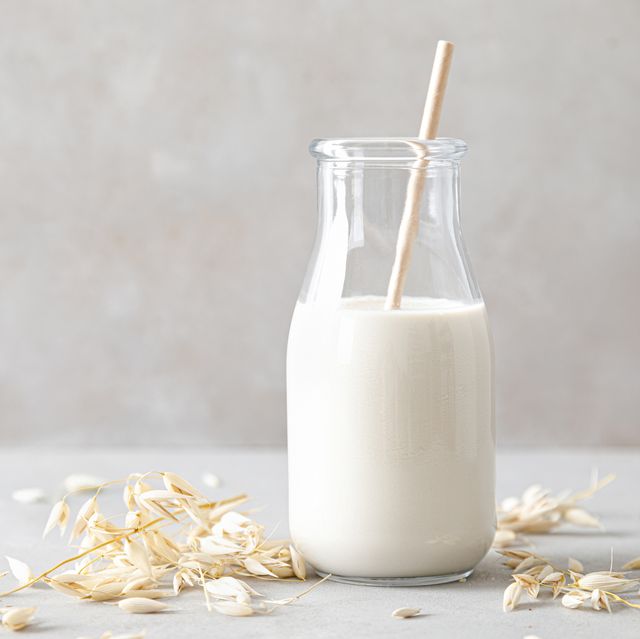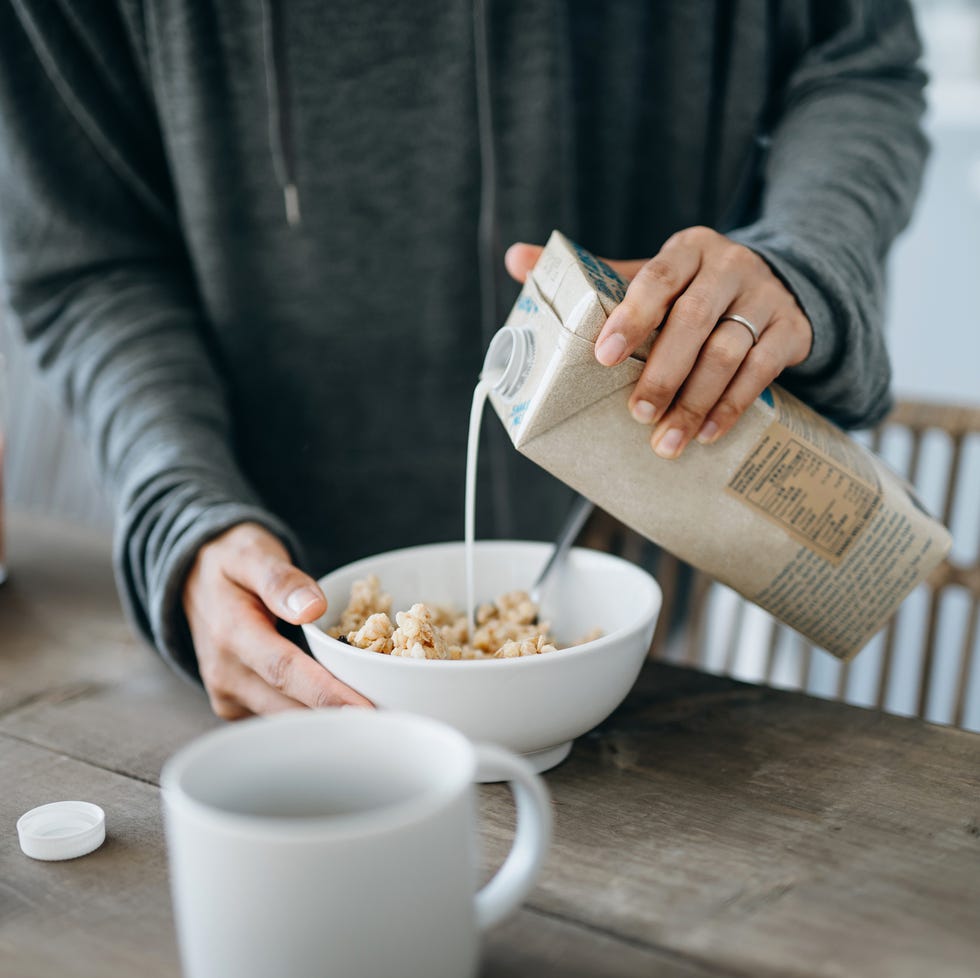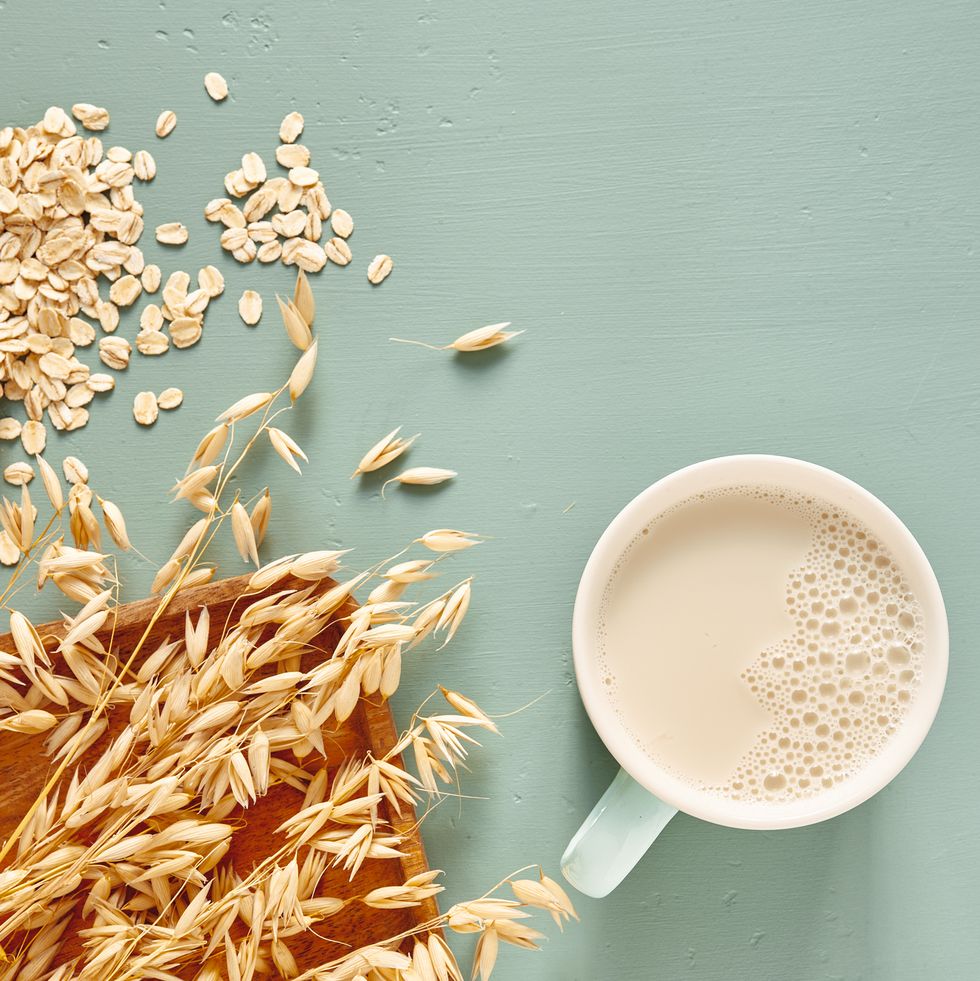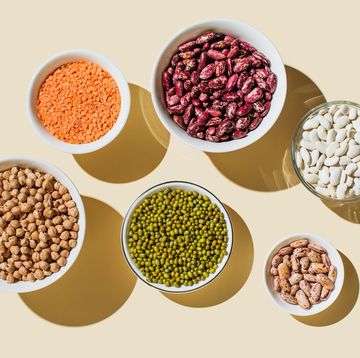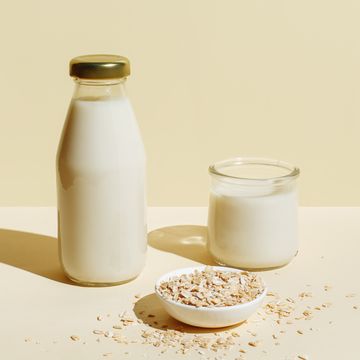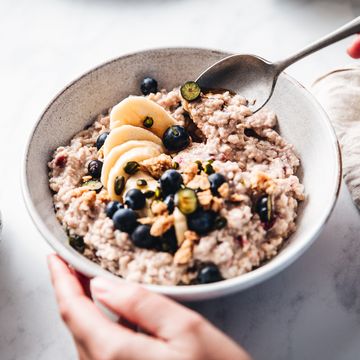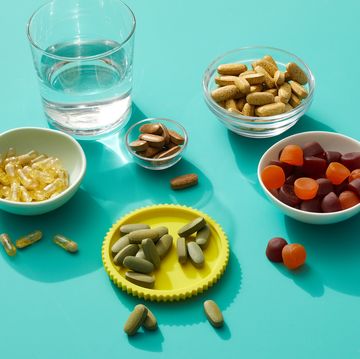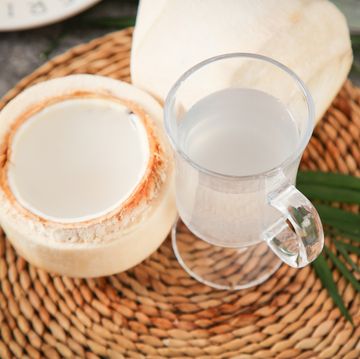A few years ago, when oat milk joined the ranks of almond, rice and soy on store shelves and coffee shops, it seemed like just the latest in a long line of trendy plant-based milks —but now it's everywhere and is clearly here to stay. This vegan alternative to dairy milk is made by blending water and oats, and then straining out the liquid. And more and more brands of this beverage seem to pop up each year.
And it makes sense: Oat milk has turned out to be super-versatile. When it comes to lightening up a cup of java, many people prefer it over other plant-based milks like almond or soy milk since it can be frothed more easily; in fact, some companies like Oatly sell a barista version of oat milk that contains a bit more fat and is creamier. And many people who are into baking prefer subbing in oat milk for dairy because of its more-neutral taste.
If you're thinking of adding oat milk to your diet, here's everything you need to know about its health benefits, how it compares to other plant-based milks and its advantages and disadvantages to cow's milk.
Oat milk nutrition
Serving Size: 1 cup of Malk oat milk
- Calories: 90
- Total Fat: 1.5g
- Saturated Fat: 0g
- Cholesterol: 0mg
- Sodium: 190mg
- Total Carbohydrate: 17g
- Total Sugars: 6g
- Added Sugars: 6g
- Dietary Fiber: 2g
- Protein: 3g
- Calcium: 2% DV
- Iron: 2% DV
- Potassium: 2% DV
Is oat milk healthy for you?
Oats are one of the best foods you can eat for a number of reasons. First, consider the fact that they're a 100% whole grain, which means they’re filled with fiber, plant-based protein B vitamins and minerals, including iron, calcium and magnesium. Oats have also been linked to a reduced risk of heart disease — that's because they contain a type of fiber called beta-glucan that's been shown to improve cholesterol levels and even help with blood sugar control. This fiber provides prebiotics too, which fuel your body’s probiotics and help these friendly bacteria survive and thrive. Eating foods with beta-glucan has also been linked to improved immunity and gut health.
All of this brings up the question: Does oat milk have enough of that oat-superpower to make it as healthy as food made with the whole grain? It's still too early to say if the beta-glucan or other forms of soluble fiber added to oat milk during processing has all of the same effects as regularly eating oats. Some initial research has linked potential cholesterol-lowering benefits to beta-glucan in beverage form, but the advantages for your heart and immune system also depend on what else you eat each day. Meaning, are you chowing down on veggies, fruit, beans, nuts, seeds, seafood, cheese, unsweetened yogurt and 100% whole grains? That's a key question for your health.
Is oat milk healthier than regular cow's milk?
Oat milk that you buy at the store often has a similar amount of vitamins and minerals as traditional cow's milk. That's because the FDA permits fortifying milk and non-dairy substitutes with vitamin D and vitamin A. One cup of fortified milk — either oat or cow — provides about 20% of your daily value for each. Manufacturers may also add vitamin B12, calcium and riboflavin to oat milks to provide some nutrients found naturally in cow’s milk.
The two kinds also contain a similar number of calories (90-150 depending on the brand) in a 1-cup serving, but oat milk has more carbs (16-17g versus 12g) and fiber (2-3g versus 0g) and less protein (3g versus 8g). The additional protein in cow’s milk may keep you fuller longer, since it prolongs the digestion and absorption process in your GI tract.
That said, it’s crucial to check labels before you swap out a dairy-based option for a plant-based one, since marketing claims can make "vegan," "lactose-free," or "non-dairy" food products appear more nutritious than they actually are. Even oat milks labeled as "Plain" or "Original" can contain added sugar.
Is oat milk healthier than almond milk?
Oat milk tends to have a nice creamy consistency that blends well, and that makes it a popular substitute in coffee drinks and the like. And if you're dairy-free or have allergies to almonds, coconut or soy, oat milk can prove to be a safe option. If you're lactose-free, how "good for you" oat milk is compared to almond milk and other plant-based alternatives depends entirely on two factors:
- Are you choosing an unsweetened version? For both oat and almond milks, it's a good idea to look for types that say "unsweetened" on the front of the package, and check the nutrition facts label to ensure there's 0g of added sugar per serving. Heads up: "Barista Blend" often has added sugar — it's designed to have a creamier texture for milk foam in lattes. For instance, Califa Farms Barista Blend Oat Milk has 3g of sugar per cup—but considering that you may just be using a splash in your coffee, that's usually fine in a healthy diet.
- How much of it are you drinking? If you love the taste of oat milk, then by all means pour an unsweetened version in coffee, tea, cereal or homemade smoothies. But if you're choosing oat milk for its perceived weight-loss benefits, know that it has slightly more calories than unsweetened almond milk, which can add up if you’re drinking it by the gallon or adding it to basically everything. Unsweetened almond milk has about 30 calories per cup, compared to 90 calories and up for oat milk.
Is oat milk good for your skin?
Some research has shown that swapping cow's dairy for a plant-based alternative may be helpful in reducing acne, but the data is pretty mixed and somewhat inconclusive (it's tough to tell if there's a cause-and-effect relationship between cow's milk and acne, or if there's a dose response). My recommendation is to try both and see if you notice a difference. Give yourself at least two weeks to let your body adjust, but remember: Anything you remove from your diet is only going to be as good as what you're replacing it with, so look for oat milk that's plain and unsweetened; made from water, oats, and as few additional ingredients added to the mix as possible; and fortified with calcium, vitamin D and vitamin A.
Is oat milk good for your heart?
Sweetened oat milks are sugar-sweetened beverages — and sugary beverages are the #1 source of added sugar in the American diet. There's no real data yet that show a benefit between drinking oat milk and risk of heart disease, but oats have plenty of research to back up their cholesterol-lowering benefits! If you use an unsweetened oat milk when you're making oatmeal, and if that's the catalyst for you to include more of it in your day-to-day meals and snacks, go for it. Otherwise, I'd stick with a low-fat or non-fat version of cow's milk or a plant-based alternative that's unsweetened and comparable to cow's milk in protein content and is fortified with vitamins and minerals.
Is oat milk good for your stomach?
If you're lactose intolerant, drinking oat milk as a plant-based alternative to cow's milk can definitely help reduce your symptoms of gas, bloating, diarrhea, nausea, constipation and anything/everything therein. But since sweetened beverages may also contribute to gas and bloating, this is another reason to stick with unsweetened options.
Is there a downside to drinking oat milk?
For those with celiac disease or gluten-intolerance, you shouldn't necessarily assume that oat milk is gluten-free. Some oats are processed on shared equipment, so look for a Certified Gluten-Free symbol on packaging to have peace of mind that the product meets strict gluten-free standards.
Other than that, it can be tough to find an oat milk option without added sugar, and of course the drink can be quite pricey— but overall, there aren't any major disadvantages to choosing this beverage.

A registered dietitian with a Bachelor of Arts degree from Northwestern University and a Master of Science degree in Clinical Nutrition from New York University, Jaclyn “Jackie” London handled all of Good Housekeeping’s nutrition-related content, testing, and evaluation from 2014 to 2019. Prior to joining GH, she was a clinical dietitian at Mount Sinai Hospital. Jackie has also appeared as an expert guest on The Dr. Oz Show and The Today Show. She is also author of the book Dressing on the Side (and Other Diet Myths Debunked).
